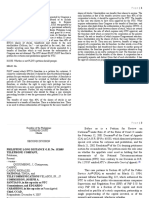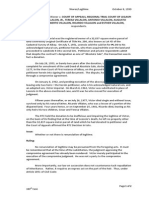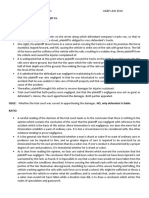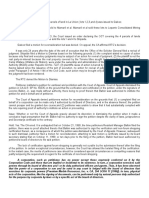0 ratings0% found this document useful (0 votes)
100 viewsSancho V Abella
Sancho V Abella
Uploaded by
Praisah Marjorey Picot(1) Matea Abella, an 88-year old woman, stopped at a convent in San Fernando, La Union while seeking medical treatment and expressed her desire to draft a will;
(2) Her will, which left some property to the local bishop, was drafted over two days in the presence of priests and witnesses;
(3) A relative contested the will, arguing Abella had senile debility and was unduly influenced; however, the court found multiple facts proving Abella's mental competence and no evidence of undue influence, merely because she stayed at the convent;
(4) The court upheld the will, finding neither senile debility nor poor memory alone prove incapacity, and
Copyright:
© All Rights Reserved
Available Formats
Download as DOCX, PDF, TXT or read online from Scribd
Sancho V Abella
Sancho V Abella
Uploaded by
Praisah Marjorey Picot0 ratings0% found this document useful (0 votes)
100 views2 pages(1) Matea Abella, an 88-year old woman, stopped at a convent in San Fernando, La Union while seeking medical treatment and expressed her desire to draft a will;
(2) Her will, which left some property to the local bishop, was drafted over two days in the presence of priests and witnesses;
(3) A relative contested the will, arguing Abella had senile debility and was unduly influenced; however, the court found multiple facts proving Abella's mental competence and no evidence of undue influence, merely because she stayed at the convent;
(4) The court upheld the will, finding neither senile debility nor poor memory alone prove incapacity, and
Original Description:
DIGEST
Original Title
Sancho-v-Abella
Copyright
© © All Rights Reserved
Available Formats
DOCX, PDF, TXT or read online from Scribd
Share this document
Did you find this document useful?
Is this content inappropriate?
(1) Matea Abella, an 88-year old woman, stopped at a convent in San Fernando, La Union while seeking medical treatment and expressed her desire to draft a will;
(2) Her will, which left some property to the local bishop, was drafted over two days in the presence of priests and witnesses;
(3) A relative contested the will, arguing Abella had senile debility and was unduly influenced; however, the court found multiple facts proving Abella's mental competence and no evidence of undue influence, merely because she stayed at the convent;
(4) The court upheld the will, finding neither senile debility nor poor memory alone prove incapacity, and
Copyright:
© All Rights Reserved
Available Formats
Download as DOCX, PDF, TXT or read online from Scribd
Download as docx, pdf, or txt
0 ratings0% found this document useful (0 votes)
100 views2 pagesSancho V Abella
Sancho V Abella
Uploaded by
Praisah Marjorey Picot(1) Matea Abella, an 88-year old woman, stopped at a convent in San Fernando, La Union while seeking medical treatment and expressed her desire to draft a will;
(2) Her will, which left some property to the local bishop, was drafted over two days in the presence of priests and witnesses;
(3) A relative contested the will, arguing Abella had senile debility and was unduly influenced; however, the court found multiple facts proving Abella's mental competence and no evidence of undue influence, merely because she stayed at the convent;
(4) The court upheld the will, finding neither senile debility nor poor memory alone prove incapacity, and
Copyright:
© All Rights Reserved
Available Formats
Download as DOCX, PDF, TXT or read online from Scribd
Download as docx, pdf, or txt
You are on page 1of 2
SANCHO v.
ABELLA testatrix was 88 years of age when she made her
G.R. No. L-39033 November 13, 1933 will, she was already suffering from senile debility
FACTS: and therefore her mental faculties were not
functioning normally anymore and that she was not
On April 13, 1932, Matea Abella—the fully aware of her acts. As an indication of her senile
testatrix, accompanied by her niece debility, respondent attempted to prove that the
Filomena Inay, left her home to consult a testatrix had very poor memory in connection with
physician in San Fernando, La Union, her properties and interest; that she could not go
stopping at the convent of the parish downstairs without assistance, and that she could
church of the said municipality, in charge of not recall her recent acts.
Father Cordero with whom she was
acquainted he having been the parish priest ISSUE: WON the testatrix is of sound mind at the
of Sinait. time of the execution of her will? YES.
During her stay in the said convent, she
went to Dr. Antonio Querol's clinic twice RULING: : (1) Neither senile debility, nor deafness,
within the period of one week accompanied nor blindness, nor poor memory, is by itself
by her aforesaid niece, Filomena Inay, to sufficient to establish the presumption that the
consult the said physician who, after person suffering therefrom is not in the full
submitting her to a general medical enjoyment of his mental faculties, when there is
examination, found that she was suffering sufficient evidence of his mental sanity at the time of
from dyspepsia and cancer of the stomach the execution of the will; and (2) that neither the
fact of her being given accommodations in a
April 26, 1932, Matea Abella—the testatrix,
convent, nor the presence of the parish priest, nor a
expressed her desire to make a will, in the
priest acting as a witness, constitutes undue
presence of the Father Cordero's sister,
influence sufficient to justify the annulment of a
Father Zoilo Aguda, Macario Calug and the
legacy in favor of the bishop of a diocese made in
fiscal of the convent.
her will by a testatrix 88 years of age, suffering from
Due to some reasons, the interview with
defective eyesight and hearing, while she is stopping
the testatrix did not finish on the first day
at a convent within the aforestated diocese.
and had to continue it the following day,
also in the presence of Father Cordero, his EVIDENCE TO PROVE HER SANITY: As to the mental
sister, Filomena Inay. sanity of the testatrix at the time of the execution of
After the will had been drafted in Ilocano, her will, we have the undisputed fact of her having
the dialect of the testatrix it was again read left her home in Sinait, Ilocos Sur, in order to go to
to the testatrix and she expressed her San Fernando, La Union, to consult a doctor,
approval thereof, but inasmuch she did not stopping at the convent of the parish church; the
sign the same suggesting that it be fact of her having walked twice to the aforesaid
postponed to the following day, April 29, doctor's clinic, accompanied by her niece, Filomena
1932, which was done. Inay; the fact that she had personally furnished the
aforesaid doctor with all the necessary data
After the testatrix, each of the instrument regarding the history of her illness the fact of her
witnesses signed in the presence of the having brought with her in her trunk the deeds to
testatrix and of each and every one of the her properties; the fact of her having called for
other witnesses. After the will had been Attorney Teodoro R. Reinoso; the fact of her having
signed, Attorney Reinoso delivered the personally furnished said attorney all the data she
original and the copies thereof to the wished to embody in her relative to her properties
testatrix, retaining one for his file. and the persons in whose favor she wished to
bequeath them; the fact of her not wishing to sign
On July 3, 1932, Matea Abella died of the her will on the night of April 28, 1932, but the
senile debility in the municipality of Sinait at following day, in order to be able to see it better,
the age of 88 years. and the fact of her having affixed her signature, in
her own handwriting, to the original as well as to the
Respondent’ contentions: The testatrix was deaf
copies of her will which consisted of nine pages.
and that her eyesight was defective; inasmuch as the
All these data show that the testatrix was
not so physically weak, nor so blind, nor so
deaf, nor so lacking in intelligence that she
could not, with full understanding thereof,
dispose of her properties and make a will.
Neither senile debility, nor blindness, nor
deafness, nor poor memory, is by itself
sufficient to incapacitate a person for
making his ill (Avelino vs. De la Cruz, 21
Phil., 521;)
As to Respondent’s contention that the testatrix
bequeathed properties which she had already
donated to other persons:
The mere fact that in her will Matea Abella disposed
of properties, which she had already donated to
other persons at a prior date, is not an indication of
mental insanity. At most it constitutes forgetfulness
or a change of mind, due to ignorance of the
irrevocability of certain donations
As to undue influence in the execution of the will:
It is insinuated that the testatrix has been unduly
influenced in the execution of her will. There is
nothing in the records establishing such claim either
directly or indirectly. The fact of her having stopped
at the convent of the parish church of San Fernando,
La Union, is not unusual in the Philippines where,
due to lack of hotels, the town convents are usually
given preference by strangers because they are
given better accommodations and allowed more
freedom.
In the present case, the testatrix Matea Abella was a
stranger in San Fernando, La Union. Inasmuch as
Father Cordero, the parish priest of the said town,
was well known to her having served in the church of
Sinait, Ilocos Sur, in the same capacity, she did not
have any difficulties in obtaining accommodations in
his convent. The fact that Matea Abella stopped at a
convent and enjoyed the hospitality of a priest who
gave her accommodations therein, nor the fact that
the will was executed in the convent in question in
the presence of the parish priest and witnessed by
another priest, could certainly not be considered as
an influence which placed her under the obligation
to bequeath of her property to the bishop of said
diocese.
You might also like
- How To Split PostingDocument14 pagesHow To Split Postingrajis75100% (1)
- Case 2: Vs - Sandiganbayan (Fourth Division), Jose LDocument3 pagesCase 2: Vs - Sandiganbayan (Fourth Division), Jose Lidmu bcpo100% (1)
- 3 Division: Taxation I Case Digest CompilationDocument2 pages3 Division: Taxation I Case Digest CompilationPraisah Marjorey Picot0% (1)
- Labor Relations Case Digest Compilation: Dev't. Corp. v. Hon. Leogardo, Which Stated That TheDocument2 pagesLabor Relations Case Digest Compilation: Dev't. Corp. v. Hon. Leogardo, Which Stated That ThePraisah Marjorey Picot100% (2)
- Course Syllabus In: First Semester 2020 - 2021Document7 pagesCourse Syllabus In: First Semester 2020 - 2021Cristy Lansangan Mejia100% (1)
- Worcester v. OcampoDocument27 pagesWorcester v. OcampoJerickson A. ReyesNo ratings yet
- Quick Reviewer On Legal FormsDocument30 pagesQuick Reviewer On Legal FormsNombs NomNo ratings yet
- Reviewer On SuccessionDocument20 pagesReviewer On SuccessionChelsea GarciaNo ratings yet
- Case Digests ACEDocument42 pagesCase Digests ACEamikaeylaNo ratings yet
- Bank of The Philippine Islands Vs Court of AppealsDocument1 pageBank of The Philippine Islands Vs Court of AppealsJENNY BUTACANNo ratings yet
- PLDT vs. NTCDocument9 pagesPLDT vs. NTCflorangelineNo ratings yet
- Santos vs. Arsenio and ReyesDocument2 pagesSantos vs. Arsenio and ReyesyaneedeeNo ratings yet
- Dagdag vs. Nepomuceno Et Al.Document5 pagesDagdag vs. Nepomuceno Et Al.CofeelovesIronman JavierNo ratings yet
- Art 1828 - 1867 DigestsDocument8 pagesArt 1828 - 1867 Digestsnina armadaNo ratings yet
- Both Parties Filed Separate Recourses To The CADocument2 pagesBoth Parties Filed Separate Recourses To The CANiajhan PalattaoNo ratings yet
- Huang VS CADocument7 pagesHuang VS CAFbarrsNo ratings yet
- Securities and Exchange Commission vs. Prosperity Com Inc. (G.r. No. 164197, January 25, 2012)Document4 pagesSecurities and Exchange Commission vs. Prosperity Com Inc. (G.r. No. 164197, January 25, 2012)Riss GammadNo ratings yet
- Yap Tua V Yap CA KuanDocument2 pagesYap Tua V Yap CA KuanGillian CalpitoNo ratings yet
- 163 Imperial Vs CA Share LegitimeDocument2 pages163 Imperial Vs CA Share LegitimeDonvidachiye Liwag CenaNo ratings yet
- PNB V. Picornell FACTS: Bartolome Picornell, Following Instruction Hyndman, Tavera &Document6 pagesPNB V. Picornell FACTS: Bartolome Picornell, Following Instruction Hyndman, Tavera &Tom Lui EstrellaNo ratings yet
- Conflicts of Law 1st ExamDocument53 pagesConflicts of Law 1st ExamjaneNo ratings yet
- 30 Wright v. Manila Electric R.R. & Light Co.Document1 page30 Wright v. Manila Electric R.R. & Light Co.Rem SerranoNo ratings yet
- Orporate Overnance Nformation IghtsDocument6 pagesOrporate Overnance Nformation IghtsdoraemoanNo ratings yet
- Shipside Vs CADocument1 pageShipside Vs CARM MallorcaNo ratings yet
- A Written Report On Agency Articles 1878-1883: Cor Jesu CollegeDocument8 pagesA Written Report On Agency Articles 1878-1883: Cor Jesu CollegeCharlotte GallegoNo ratings yet
- Heirs of T. de Leon Vda de Roxas v. CADocument3 pagesHeirs of T. de Leon Vda de Roxas v. CALeo TumaganNo ratings yet
- BERT OSMEÑA & ASSOCIATES - DigestDocument1 pageBERT OSMEÑA & ASSOCIATES - DigestMichael C. PayumoNo ratings yet
- Spec Pro CasesDocument19 pagesSpec Pro Casespaul2574No ratings yet
- 9th WeekDocument6 pages9th WeekStephanie GriarNo ratings yet
- Ang Tek Lian Vs CADocument1 pageAng Tek Lian Vs CAGeorge AlmedaNo ratings yet
- CD - 39. Union Bank V SantibanezDocument2 pagesCD - 39. Union Bank V SantibanezalyssaNo ratings yet
- Santos vs. AlanaDocument8 pagesSantos vs. AlanaAilein Grace100% (1)
- Rule 114, 115 & 116 CasesDocument41 pagesRule 114, 115 & 116 CasesfatimasenNo ratings yet
- 116-Manuel R. Dulay Enterprises vs. CA 225 Scra 678Document6 pages116-Manuel R. Dulay Enterprises vs. CA 225 Scra 678Jopan SJNo ratings yet
- Eloy Imperial Vs Court of AppealsDocument2 pagesEloy Imperial Vs Court of AppealsgirlNo ratings yet
- PALE - Short PaperDocument13 pagesPALE - Short PaperWindy Awe MalapitNo ratings yet
- Pioneer v. CADocument2 pagesPioneer v. CAJessica Rhea CruzNo ratings yet
- Gokongwei Vs SECDocument2 pagesGokongwei Vs SECzahreenamolinaNo ratings yet
- In Re PalagnasDocument2 pagesIn Re Palagnasralliv jacNo ratings yet
- DBP Vs CapulongDocument2 pagesDBP Vs CapulongRepolyo Ket CabbageNo ratings yet
- Case 28 Laborte Et Al. vs. Pagsanjan Tourism Consumers' Corp Et Al (Jan 2014)Document2 pagesCase 28 Laborte Et Al. vs. Pagsanjan Tourism Consumers' Corp Et Al (Jan 2014)Frances Abigail BubanNo ratings yet
- Gevero vs. IACDocument8 pagesGevero vs. IACJane Paez-De MesaNo ratings yet
- Saturnino Vs PaulinoDocument2 pagesSaturnino Vs PaulinoRinielNo ratings yet
- Alvarado v. Gaviola, G.R. No. 74695, September 14, 1993 (226 SCRA 347) PDFDocument6 pagesAlvarado v. Gaviola, G.R. No. 74695, September 14, 1993 (226 SCRA 347) PDFryanmeinNo ratings yet
- Wills - Conde Vs AbayaDocument2 pagesWills - Conde Vs AbayaMara Corteza San PedroNo ratings yet
- Echavez v. Dozen Construction PDFDocument3 pagesEchavez v. Dozen Construction PDFCathy BelgiraNo ratings yet
- Umpa - Alejandrino vs. Ca, Gr. No. 114151Document1 pageUmpa - Alejandrino vs. Ca, Gr. No. 114151Babylove UmpaNo ratings yet
- Arellano V PascualDocument3 pagesArellano V PascualM Azeneth JJNo ratings yet
- Azuela vs. CA Facts:: Soliven, GuillermoDocument3 pagesAzuela vs. CA Facts:: Soliven, GuillermoKrisha Marie CarlosNo ratings yet
- Case Digest Sux Javellana SanoDocument4 pagesCase Digest Sux Javellana SanoGlen EnterinaNo ratings yet
- Locsin v. CA PDFDocument2 pagesLocsin v. CA PDFKira JorgioNo ratings yet
- Dorotheo v. Court of Appeals G.R. No. 108581, 08 December 1999Document17 pagesDorotheo v. Court of Appeals G.R. No. 108581, 08 December 1999Andrea GarciaNo ratings yet
- Phil. Veterans Bank V CADocument8 pagesPhil. Veterans Bank V CAApril DiolataNo ratings yet
- Collation (Arellano v. Pascual)Document1 pageCollation (Arellano v. Pascual)apperdapperNo ratings yet
- Llanto Vs AlzonaDocument7 pagesLlanto Vs AlzonaRuth GaleraNo ratings yet
- Manalo V ParedesDocument3 pagesManalo V ParedesLuz Celine CabadingNo ratings yet
- 213) in Re Estate of Piraso, Deceased. SIXTO ACOP, Petitioner-Appellant, vs. SALMING PIRASO, ET AL., Opponents-Appellees. 52 PHIL 660Document2 pages213) in Re Estate of Piraso, Deceased. SIXTO ACOP, Petitioner-Appellant, vs. SALMING PIRASO, ET AL., Opponents-Appellees. 52 PHIL 660Mark Lawrence Aguirre PatiagNo ratings yet
- Alvarado vs. Gaviola Jr.Document8 pagesAlvarado vs. Gaviola Jr.Dexter CircaNo ratings yet
- SpecPro Rules 84-88Document47 pagesSpecPro Rules 84-88BananaNo ratings yet
- San Juan Structural and Steel Fabricators, Inc. vs. Court of Appeals, 296 SCRA 631Document3 pagesSan Juan Structural and Steel Fabricators, Inc. vs. Court of Appeals, 296 SCRA 631Ryan Christian LuposNo ratings yet
- 36 Sancho V Abella MontemayorDocument2 pages36 Sancho V Abella MontemayorCelest AtasNo ratings yet
- Sancho v. Abella, G.R. No. 39033, (November 13, 1933), 58 PHIL 728-733)Document4 pagesSancho v. Abella, G.R. No. 39033, (November 13, 1933), 58 PHIL 728-733)yasuren2No ratings yet
- Sancho Vs AbellaDocument2 pagesSancho Vs Abellajerico kier nonoNo ratings yet
- Succession Law CasesDocument9 pagesSuccession Law Casesione salveronNo ratings yet
- 2 Division: Taxation I Case Digest CompilationDocument2 pages2 Division: Taxation I Case Digest CompilationPraisah Marjorey Picot100% (1)
- Taxation I Case Digest Compilation: Philex Mining v. CADocument2 pagesTaxation I Case Digest Compilation: Philex Mining v. CAPraisah Marjorey PicotNo ratings yet
- Taxation I Case Digest Compilation: en BancDocument3 pagesTaxation I Case Digest Compilation: en BancPraisah Marjorey PicotNo ratings yet
- Taxation I Case Digest CompilationDocument2 pagesTaxation I Case Digest CompilationPraisah Marjorey PicotNo ratings yet
- En Banc: Taxation I Case Digest CompilationDocument2 pagesEn Banc: Taxation I Case Digest CompilationPraisah Marjorey PicotNo ratings yet
- Visayan Although Residing in San Juan, Rizal at The Time of His Death. The Will Was Executed in The CityDocument1 pageVisayan Although Residing in San Juan, Rizal at The Time of His Death. The Will Was Executed in The CityPraisah Marjorey PicotNo ratings yet
- En Banc: Taxation I Case Digest CompilationDocument1 pageEn Banc: Taxation I Case Digest CompilationPraisah Marjorey PicotNo ratings yet
- OR WON The Dissimilarity in Handwriting Is Sufficient To Deny Probate of The Will - NODocument2 pagesOR WON The Dissimilarity in Handwriting Is Sufficient To Deny Probate of The Will - NOPraisah Marjorey PicotNo ratings yet
- Reyes Vs Vda. de Vidal DigestDocument2 pagesReyes Vs Vda. de Vidal DigestPraisah Marjorey Picot100% (1)
- TORRES Vs LOPEZDocument1 pageTORRES Vs LOPEZPraisah Marjorey PicotNo ratings yet
- Vda de Enriquez vs. AbadiaDocument1 pageVda de Enriquez vs. AbadiaPraisah Marjorey PicotNo ratings yet
- Ancheta Vs Guersey Dalaygon DigestDocument1 pageAncheta Vs Guersey Dalaygon DigestPraisah Marjorey PicotNo ratings yet
- 2 Division: Taxation I Case Digest CompilationDocument2 pages2 Division: Taxation I Case Digest CompilationPraisah Marjorey PicotNo ratings yet
- Miciano v. BrimoDocument2 pagesMiciano v. BrimoPraisah Marjorey PicotNo ratings yet
- (En Banc) : Manila International Airport Authority v. CA, City of Parañaque, Et. AlDocument5 pages(En Banc) : Manila International Airport Authority v. CA, City of Parañaque, Et. AlPraisah Marjorey PicotNo ratings yet
- Labor Relations Case Digest CompilationDocument2 pagesLabor Relations Case Digest CompilationPraisah Marjorey PicotNo ratings yet
- (En Banc) : Ferrer, Jr. vs. BautistaDocument3 pages(En Banc) : Ferrer, Jr. vs. BautistaPraisah Marjorey PicotNo ratings yet
- Commissioner of Internal Revenue v. CA CTA YMCA 1998Document4 pagesCommissioner of Internal Revenue v. CA CTA YMCA 1998Praisah Marjorey PicotNo ratings yet
- Aznar vs. Christensen Garcia, Said Doctrine Is UsuallyDocument2 pagesAznar vs. Christensen Garcia, Said Doctrine Is UsuallyPraisah Marjorey PicotNo ratings yet
- En Banc: Taxation I Case Digest CompilationDocument2 pagesEn Banc: Taxation I Case Digest CompilationPraisah Marjorey PicotNo ratings yet
- M.Y. San Biscuits, Inc. vs. Laguesma G.R. 95011 - April 22, 1991Document1 pageM.Y. San Biscuits, Inc. vs. Laguesma G.R. 95011 - April 22, 1991Praisah Marjorey PicotNo ratings yet
- Labor Relations Case Digest CompilationDocument1 pageLabor Relations Case Digest CompilationPraisah Marjorey PicotNo ratings yet
- Labor Relations Case Digest CompilationDocument3 pagesLabor Relations Case Digest CompilationPraisah Marjorey PicotNo ratings yet
- MERALCO Vs Secretary of Labor DigestDocument2 pagesMERALCO Vs Secretary of Labor DigestPraisah Marjorey Picot100% (2)
- Caltex Vs Commission On Audit 1992Document1 pageCaltex Vs Commission On Audit 1992Praisah Marjorey PicotNo ratings yet
- Legal Personality Cannot Be Subject To Collateral AttackDocument2 pagesLegal Personality Cannot Be Subject To Collateral AttackPraisah Marjorey PicotNo ratings yet
- Labor Relations Case Digest Compilation: San Jose City Vs Mole & Magkaisa-Adlo G.R. No. 77231 May 31, 1989Document1 pageLabor Relations Case Digest Compilation: San Jose City Vs Mole & Magkaisa-Adlo G.R. No. 77231 May 31, 1989Praisah Marjorey PicotNo ratings yet
- Labor Relations Case Digest Compilation: G.R. Nos. 43633-34 September 14, 1990Document4 pagesLabor Relations Case Digest Compilation: G.R. Nos. 43633-34 September 14, 1990Praisah Marjorey PicotNo ratings yet
- Public Health LawDocument2 pagesPublic Health LawKristineNo ratings yet
- 2023 Michigan Hunting Regulations SummaryDocument80 pages2023 Michigan Hunting Regulations SummaryWDIV/ClickOnDetroitNo ratings yet
- 7 The Incredible Machine Free SampleDocument5 pages7 The Incredible Machine Free Sampleperis shiruNo ratings yet
- 2021 SBU Red Book Volume 2 - Legal and Judicial EthicsDocument43 pages2021 SBU Red Book Volume 2 - Legal and Judicial EthicsJong CjaNo ratings yet
- Canon 1 5 CasesDocument124 pagesCanon 1 5 CasesBaldovino VenturesNo ratings yet
- CARC-Codes FinalDocument15 pagesCARC-Codes Finaltrainer.rinkutpNo ratings yet
- Toland-Dix - The Hills of Hebron - Sylvia Wynter's Disruption of The Narrative of The NationDocument20 pagesToland-Dix - The Hills of Hebron - Sylvia Wynter's Disruption of The Narrative of The NationfirexcrackerNo ratings yet
- Japan MediaDocument27 pagesJapan MediaRamwen JameroNo ratings yet
- Questionnaire: Different Modes of Entertainment Preferred by PeopleDocument4 pagesQuestionnaire: Different Modes of Entertainment Preferred by PeopleAnmol KaurNo ratings yet
- Refugee Education: Integration Models and Practices in Oecd CountriesDocument73 pagesRefugee Education: Integration Models and Practices in Oecd CountriesPANAGIOTIS MANIATISNo ratings yet
- Group ProcessesDocument34 pagesGroup ProcessesNetsu JenNo ratings yet
- Unit Four: Audit Responsibilities and ObjectivesDocument44 pagesUnit Four: Audit Responsibilities and ObjectiveseferemNo ratings yet
- Analysis and Approaches 1 Page Formula SheetDocument1 pageAnalysis and Approaches 1 Page Formula SheetAmanda Poetiray100% (1)
- United Nations Environment Programme (UNEP)Document6 pagesUnited Nations Environment Programme (UNEP)Md KamruzzamanNo ratings yet
- Unit 4 (IPR)Document10 pagesUnit 4 (IPR)sachinyadavv13No ratings yet
- Book 1Document18 pagesBook 1Andreea BorceaNo ratings yet
- Pharande Woodsville Phase 3 Cluster B Automated BrochureDocument4 pagesPharande Woodsville Phase 3 Cluster B Automated BrochureSaransh SharmaNo ratings yet
- Peng v. Schedule A - 2d PI ReplyDocument14 pagesPeng v. Schedule A - 2d PI ReplySarah BursteinNo ratings yet
- Liverpool University Press Essentials of Financial ManagementDocument4 pagesLiverpool University Press Essentials of Financial Managementkamran raiysatNo ratings yet
- RK Anand Vs Registrar Delhi High Court 2009Document72 pagesRK Anand Vs Registrar Delhi High Court 2009Shikhar RawatNo ratings yet
- Taxation Suggested SolutionsDocument3 pagesTaxation Suggested SolutionsSteven Mark MananguNo ratings yet
- Civics Form Two 2023Document9 pagesCivics Form Two 2023dnnspetroNo ratings yet
- Jad. Liquidation ActiveDocument1 pageJad. Liquidation ActiveJhelex De castroNo ratings yet
- Subject: of The of The F: Implementation CentralDocument1 pageSubject: of The of The F: Implementation CentralBhavagna SaiNo ratings yet
- BPZ6B Bpf6a BPW6C A12Document8 pagesBPZ6B Bpf6a BPW6C A12aditya pandianNo ratings yet
- Dabur ConsolidatedDocument92 pagesDabur ConsolidatedRatla Bhukya Rama KrishnaNo ratings yet
- Application For Full TranscriptDocument2 pagesApplication For Full TranscriptAhmad HafizNo ratings yet
- Alfonso de Los Reyes, Et Al. vs. Luis de LeonDocument3 pagesAlfonso de Los Reyes, Et Al. vs. Luis de LeonKeyan MotolNo ratings yet























































































































